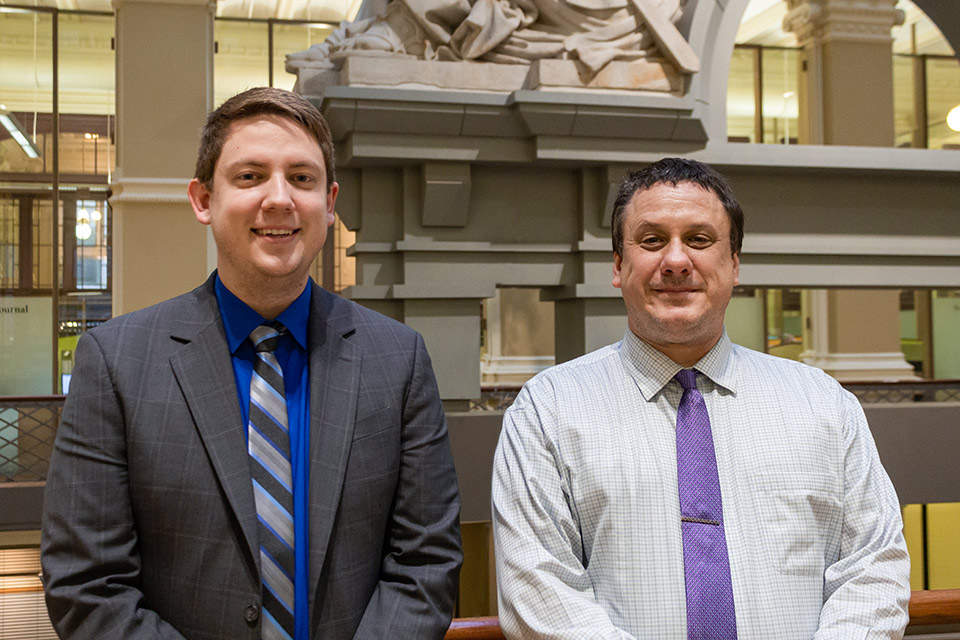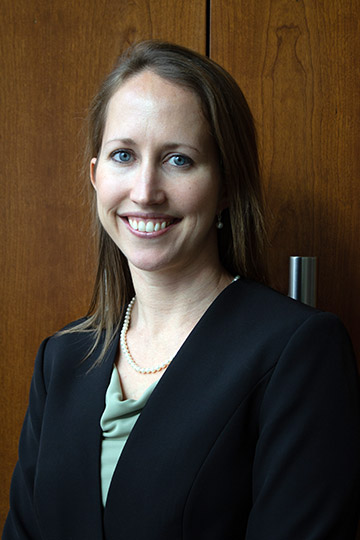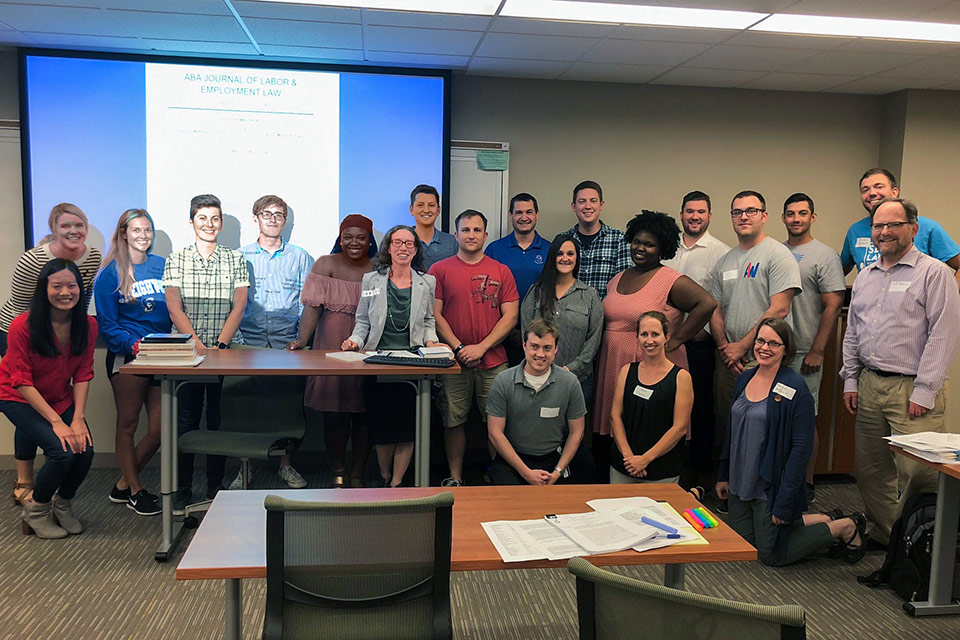Spotlight on the William C. Wefel Center for Employment Law
The William C. Wefel Center for Employment Law has been receiving exciting national recognition this year.
New Home to ABA Journal
After a competitive process among several other law schools in 2018, the Wefel Center was selected as the new editorial home of the ABA Journal of Labor & Employment Law (formerly The Labor Lawyer).
The journal’s circulation includes the 20,000 members of the ABA Section of Labor and Employment Law. Published since 1985, the journal provides balanced discussions of current developments in labor and employment law to meet the practical needs of attorneys, judges, administrators and the public.
Editorial work on the journal is a faculty-student collaboration, and student editors write a note or comment that may be selected for publication. For the journal’s inaugural year at SLU LAW (2018-19), 24 students served on the staff. Faculty editors are professors Matt Bodie, Miriam Cherry and Marcia McCormick.
One of the Top 3 Programs Nationwide
In its winter 2019 issue, PreLaw Magazine ranked the Wefel Center as among the country’s top three programs in labor and employment law. The magazine noted the Center’s comprehensive academic program and breadth of student opportunities, including the Semester in D.C. program and the chance to edit and write for the ABA Journal.
This recognition is especially significant because the labor and employment law specialty is not currently ranked by traditional ranking publications like U.S. News & World Report. With this distinction, SLU LAW impressively holds top marks nationwide in two critical areas of law, including the health law program.
As the field of employment and labor law continues to evolve, with the booming global gig economy, the continuing implications of the #MeToo movement, and the shifting role of labor unions in the U.S., SLU LAW’s Wefel Center has positioned itself as not only adaptable to the new landscape but exceedingly relevant in helping the next generation of lawyers prepare themselves for the future.
Miriam Cherry at United Nations
Wefel Center co-director Miriam Cherry spent the summer of 2018 at the International Labour Office (ILO), a specialized agency of the United Nations in Geneva, Switzerland, as an invited visiting researcher. She worked on a project covering jurisdiction and crowdwork, studying how the international community might come to some regulatory consensus regarding the status of workers involved in remote employment when often more than one country’s citizens are involved. For example, when a computer program facilitates work done entirely online, such as transcribing recordings or tagging photos, Cherry says a common pattern is the website may be hosted in the U.S., but those looking for work to be done may be in Europe, and the people doing the tasks are located all around the world. Different countries regulate this type of work inconsistently.
Another issue Cherry raises is that there is no way to verify who’s on the “other end” of the screen doing the work – it could be a prisoner or a child, for instance, and no one would know the difference. Cherry advocates for global solutions before these issues spiral out of control, which she foresees happening in five to 10 years’ time. Her paper is slated to appear as an ILO working paper and in the Tulane Law Review.
Focus on Privacy Law
Last year Center co-director Matt Bodie helped make SLU LAW one of only 11 schools in the country – and the only one in the state – to participate in Privacy Pathways, a pilot program in conjunction with the International Association of Privacy Professionals (IAPP). The program aims to build on the privacy curricula offered at universities with the goal of helping students gain the skills and networking opportunities needed to jumpstart careers in privacy-related fields. Through the IAPP, students can earn a privacy law specialist certification, recently approved by the ABA. Thus far, six students have obtained or are pursuing an IAPP privacy certification.
In December, Bodie’s information-privacy class students staged a “privacy fair,” presenting topics ranging from social media to the privacy of genetic information. And two of the students from the class recently launched the newest SLU LAW student group called eLaw, whose mission is to unite students with interests regarding technology and the law and to establish a community for those who seek to improve and engage in the technology-related aspects of law. Members of eLaw participated in a Global Legal Hackathon hosted at T-REX by the law firm Bryan Cave.
Bodie’s interests in privacy law and employment law were merged when he worked on the privacy material that appears in the Restatement of Employment Law, published in 2015 by the American Law Institute.
Marcia McCormick Joins Labor Law Group
Associate dean and former Center director Marcia McCormick has been elected to membership in the Labor Law Group. Formed in the 1940s by a prominent set of labor law academics and practitioners, the Labor Law Group’s mission is to provide topnotch course materials for labor and employment law subjects.
Jack Dunsford, a beloved SLU LAW professor and co-founder of the Wefel Center, was one of the original members of the Group and worked for years on a variety of casebooks and teaching supplements. McCormick’s work continues this legacy at SLU LAW. She will begin by working on the Group’s employment discrimination casebook.
Students Set New Precedent in Unemployment Insurance Law
 Through their work in SLU LAW’s Civil Advocacy Clinic under Prof. John Ammann, 3L
Thomas Herring and 4L Sean Oliveira successfully argued a case before the Missouri Court of Appeals on behalf of a Missouri employee of an
out-of-state employer who was denied unemployment compensation upon losing her job
through no fault of her own. The issue revolved on whether the number of employees
necessary for an employer to be large enough to be covered by Missouri’s statute included
all of the employer’s workers or only those in Missouri. Herring and Oliveira argued
on the claimant’s behalf that all employees should be counted, and the court ruled
in their favor in February 2019.
Through their work in SLU LAW’s Civil Advocacy Clinic under Prof. John Ammann, 3L
Thomas Herring and 4L Sean Oliveira successfully argued a case before the Missouri Court of Appeals on behalf of a Missouri employee of an
out-of-state employer who was denied unemployment compensation upon losing her job
through no fault of her own. The issue revolved on whether the number of employees
necessary for an employer to be large enough to be covered by Missouri’s statute included
all of the employer’s workers or only those in Missouri. Herring and Oliveira argued
on the claimant’s behalf that all employees should be counted, and the court ruled
in their favor in February 2019.
Herring and Oliveira built on the work of former clinic student Marie Gillen (’18), who handled the hearing before the Labor and Industrial Commission last year and laid the evidentiary foundation for the ultimate ruling.
 In another significant Clinic case, 3L Rose Tanner argued before the Missouri Court of Appeals in December 2018 on behalf
of a client appealing to keep the unemployment benefits previously awarded to her.
Her client had been substantially demoted in pay, work hours and benefits for reasons
unrelated to her job performance, and the client was informed of this demotion via
a text message. The employee had immediately tried to address the situation, but no
modification was offered, so she felt as though she had no choice but to quit and
find alternative employment.
In another significant Clinic case, 3L Rose Tanner argued before the Missouri Court of Appeals in December 2018 on behalf
of a client appealing to keep the unemployment benefits previously awarded to her.
Her client had been substantially demoted in pay, work hours and benefits for reasons
unrelated to her job performance, and the client was informed of this demotion via
a text message. The employee had immediately tried to address the situation, but no
modification was offered, so she felt as though she had no choice but to quit and
find alternative employment.
In January 2019, the court ruled in the plaintiff’s favor, setting new precedent in Missouri for employees who have good cause to resign from a position.
To learn more about the Wefel Center for Employment Law and the opportunities for SLU LAW students in employment and labor law, visit slu.edu/law/employment.
